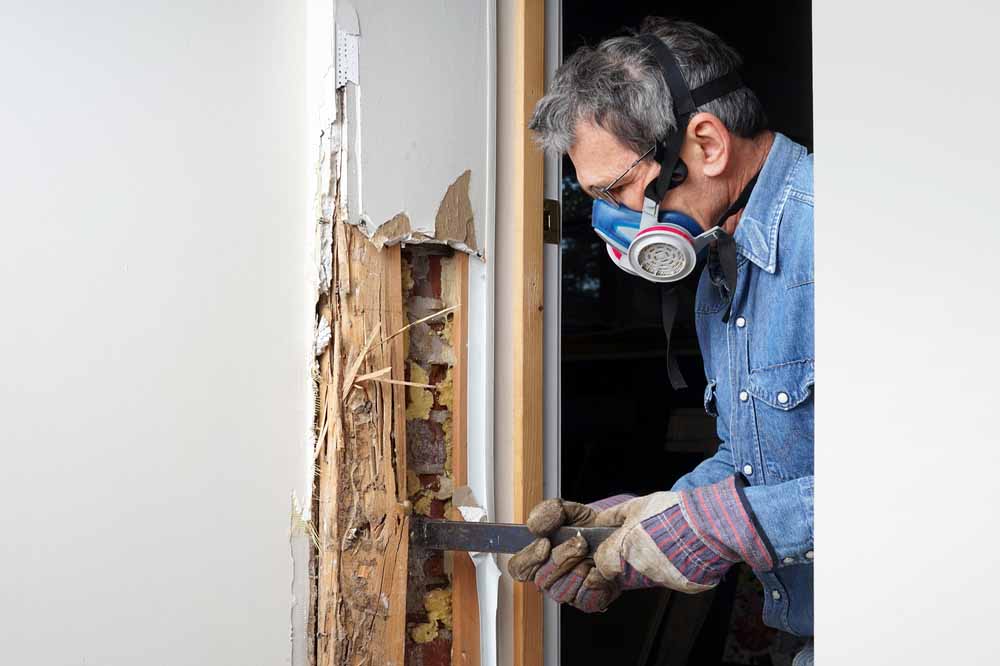Leaking showers – Decay and Damage
Drip…drip…drip… A dripping tap can be enough to drive you mad, or spur you into action. Most dripping taps can be fixed by changing a washer, tapware or by calling a plumber. But what if you’re blissfully unaware of the drip, the trickle or the torrent? Imagine if it continues on unchecked behind a wall or under the shower recess for days, months or even years? A leaking shower isn’t always as obvious as you might think, but the damage can be significant if it’s left unchecked.
Water is a force of nature responsible for carving great gashes in the landscape, levelling mountains and gnawing away at coastlines. Give it enough time and water can damage, erode, rot and destroy almost any surface. The water from a leaking shower is no different. That slow splatter or that deceptively gentle drip can cause extensive and costly structural damage to your home.
How to tell if you have a leaking shower
Sometimes it’s obvious that your shower is leaking. It might happen suddenly, or even dramatically. Tiles might peel off the wall and suddenly crash to the floor. A trickle might run from the where the tapware and tiles meet. A sizeable crack could split the surface of the floor of the shower recess.
More often than not though, a leaking shower can be a ticking time bomb. You might not realise it, but that flaking or peeling paint in your bathroom, that musty smell or that mould growing on the leather shoes in your wardrobe might actually be a symptom of a leaking shower. The damp carpet you blamed on your four-legged friend might actually be a tell-tale sign that all is not well with your shower.
These signs can be difficult to spot if you are buying a property. Vendors may make a calculated decision to achieve the best possible price for their property by covering up problems. Discolouration, mouldy, flaking or peeling paintwork can be easily concealed behind a fresh coat of paint. An unpleasant odour can be disguised with a well-timed and liberal spray of air freshener or a strategically-located scented candle. Mouldy silicone can be hastily cut out and fresh silicone squeezed into the underlying gaps in a shower recess. Evidence of a leak can be carefully and strategically concealed so as to leave potential buyers in the dark. Always get an expert building inspector to assess your ‘dream home’ before you invest.
Causes of leaking showers
To the untrained eye, it can be almost impossible to pinpoint the exact cause of a leaking shower. That’s because there are so many potential culprits. Just when you think you’ve found the source of the problem, you might discover that there are actually a number of causes of the leaks. Finding the cause of a leaking shower should be treated as a process of elimination and an exercise in patience.
Poor tapware and fittings
Some of the obvious causes of a leaking shower can be tracked back to old or poorly-fitted shower fittings or tapware. Sometimes, replacement of these fittings can alleviate or even completely stop a leak.
Shower cracks and gaps
However, there are other causes of a leaking shower that are harder to detect. They include cracked tiles or cracks in the grouting between tiles that develop over time. A subtle, hairline fracture on a fibreglass shower base might open up into something more substantial when you’re standing on it but might remain largely invisible to the naked eye when not load-bearing.
Another common cause of a leaking shower is the separation between the wall tiles and the floor tiles where they meet at the base of the shower. This can be particularly difficult to spot because of its low position, well below eye-level. A gap here can allow water ingress or seepage of the water through to the surfaces below.
Insufficient shower drainage
Blocked or inadequate drainage pipes can also be a factor contributing to your leaking shower. Human hair and soap residue are often the culprits when it comes to shower drainage problems that can overload the pipes and lead to leaks. If blocked drains occur on a regular basis, other parts of the shower that would not normally be subjected to a constant flow of water can be exposed to its damaging effects.
Vibration and water hammer
When you think about it, your shower is used on a daily basis, sometimes several times a day. The motion of the water through the pipes and shower fittings and its impact on the floor of the shower causes vibration. You might also hear water hammer; a bang or thump when you turn a tap off. Water hammer is a percussive force caused by a sudden variation in water pressure within a pipe. It can also cause damage over time in much the same way as vibration. Vibration and water hammer can cause things to work loose or to fall apart. It can cause separation between tiles and cracks in the grouting between tiles, resulting in leaks.
Inadequate or damaged waterproofing membrane
Unlike most other areas of your home, the bathroom is considered a ‘wet area’. It shares this status with a few other rooms, like parts of the kitchen, the toilet and the laundry. The design and construction of a wet area and installation of a shower must comply with both the relevant Australian standard and the Australian Building Code (BCA 2006 and BCA 2012). The Australian Standard applicable to wet areas is AS 3740-2010. Waterproofing your bathroom is critical. Grout itself is a porous substance, so the installation of a waterproof membrane provides an essential backup layer designed to keep water from leaking from a shower.
A shower will inevitably leak in circumstances where:
- The waterproof membrane was poorly installed, or not installed at all (not unheard of in DIY renovations);
- The waterproofing has become damaged over time. For example, in older properties where rubber waterproofing may have been utilised, vulcanisation can occur over time and render the waterproofing ineffective. Other types of waterproofing membranes can become damaged, torn or punctured as a house settles.
Settlement, subsidence and termite damage
Subtle or not-so-subtle movements in a home over time can also lead to a damaged shower cubicle and a leaking shower. Whilst it’s normal for a degree of settlement to occur as the soil on which your home is built becomes compacted, more significant shifts can lead to damage to the shower recess and can cause a leaking shower . For this reason, a leaking shower can be an indicator of much more serious issues at play. Similarly, termite damage can cause the type of movement in the structure of your home over time that can also contribute to the development of a leaking shower.
Problems caused by leaking showers
A leaking shower can be costly in many ways. A persistent leak can lead to the development of mould. The mould might be evident in the form of blackened or discoloured silicone or might even extend to mouldy painted surfaces such as adjacent walls or nearby ceilings. Aside from being an unpleasant thing to look at, mould can also pose a very significant health hazard. This is particularly problematic to the immuno-compromised; the elderly, young children and asthmatics.
Leaking showers can also result in unsightly damage to paintwork and plasterboard surfaces, necessitating treatment with a mould inhibiter and repainting or even replacement if the damage is significant.
A leaking shower might also lead to tiles in a shower cubicle lifting or even falling off. If left unchecked, this can lead to further water ingress and an exacerbation of the problem. Falling tiles can also be extremely dangerous, causing lacerations if they fall on a person using the shower.
If you live in an apartment building, your leaking shower can also impact on your neighbours and can result in costly damage to their premises. That could leave you open to civil litigation.
Worst of all, if a shower is allowed to leak for a prolonged period of time, it can cause immense structural damage when it encounters building materials that have not been waterproofed, like wooden joists, floorboards, beams or bearers. Water will always seek to find its own level and over time will flow to the lowest possible point. Water that is not able to escape can pool and soak into wood, causing wet rot. Left for long enough, rot can weaken wood and lead to the collapse of a building or structure.
Repairing a leaking shower
Leaking shower repairs can be extremely costly and time-consuming. They can also leave you with a bathroom that’s out of action for a prolonged period of time, which can be inconvenient. There are a lot of ‘quick fixes’ on the market. Many companies promise to reseal the shower and the results might look attractive at first glance. However, if the cause of the leaking shower is not properly investigated and diagnosed, the leak might persist and cause more significant damage over time. In the long run, this could lead to far more costly repairs such as completely rebuilding and re-waterproofing the shower or even the entire bathroom.
A professional, experienced and qualified building inspector can make all the difference. If you’re worried about your leaking shower in your existing home or have your suspicions about a shower in a property that you’re considering buying, Action Inspections should be your first port of call. They can conduct a thorough assessment of the property and provide a detailed report setting out the extent of any damage and your repair options, as well as an accurate costing so that you can weigh up your options.
Worried about your leaking shower? Call Action Property Inspections on 1800 642 465 today or book online for an inspection.

